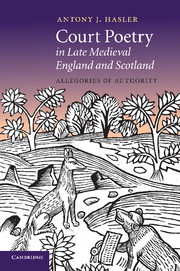Book contents
- Frontmatter
- Contents
- Acknowledgements
- Abbreviations
- Introduction
- 1 Beginnings: André's Vita Henrici Septimi and Dunbar's aureate allegories
- 2 The Bowge of Courte and the birth of the paranoid subject
- 3 “My panefull purs so priclis me”: the rhetoric of the self in Dunbar's petitionary poems
- 4 Translative senses: Alexander Barclay's Eclogues and Gavin Douglas's Palice of Honour
- 5 Mémoires d'outre-tombe: love, rhetoric and the poems of Stephen Hawes
- 6 Mapping Skelton: “Esebon, Marybon, Wheston next Barnet”
- Conclusion
- Notes
- Bibliography
- Index
- CAMBRIDGE STUDIES IN MEDIEVAL LITERATURE
6 - Mapping Skelton: “Esebon, Marybon, Wheston next Barnet”
Published online by Cambridge University Press: 04 April 2011
- Frontmatter
- Contents
- Acknowledgements
- Abbreviations
- Introduction
- 1 Beginnings: André's Vita Henrici Septimi and Dunbar's aureate allegories
- 2 The Bowge of Courte and the birth of the paranoid subject
- 3 “My panefull purs so priclis me”: the rhetoric of the self in Dunbar's petitionary poems
- 4 Translative senses: Alexander Barclay's Eclogues and Gavin Douglas's Palice of Honour
- 5 Mémoires d'outre-tombe: love, rhetoric and the poems of Stephen Hawes
- 6 Mapping Skelton: “Esebon, Marybon, Wheston next Barnet”
- Conclusion
- Notes
- Bibliography
- Index
- CAMBRIDGE STUDIES IN MEDIEVAL LITERATURE
Summary
To move from a Hawes stranded by the accession of Henry VIII to the Skelton of the early 1520s is to cross a narrower gap than might be imagined. Both poets engage with a similar crisis of symbolic investiture, revealed in discursive flights from erotic to apocalyptic and to metapoetic. My aim in this chapter is to suggest that in Skelton's case, this anxiety of location is addressed through a poetics that seeks to multiply and disperse the grounds of authority, while finding new figures for the relations among them. In contrast to André's classically “foreign” England and Barclay's Englishing of the alien, Douglas's thresholding of the epic, Dunbar's performances of disappearance and the retreats of Hawes and the earlier Skelton himself, Skelton at this stage of his career embraces a poetics that deranges spheres of authority altogether, providing intersections and divergences between them with a bewildering rapidity.
While the known facts are few, readers of Skelton's career at this period have noted a certain insecurity. The royal tutor rusticated to Diss in 1503 looks to have returned to the center of royal power in the early 1510s, but in what capacity is not known. The title of orator regius, which he assumed in or just after 1512, reveals little. Works that cannot be securely dated oscillate between laureate pretension (Calliope), royal counsel (the interlude Magnyfycence) and the flytings and invectives of less exalted court entertainment.
- Type
- Chapter
- Information
- Court Poetry in Late Medieval England and ScotlandAllegories of Authority, pp. 145 - 167Publisher: Cambridge University PressPrint publication year: 2011



